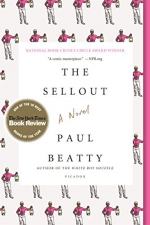
|
| Name: _________________________ | Period: ___________________ |
This test consists of 15 multiple choice questions and 5 short answer questions.
Multiple Choice Questions
1. The narrator asserts in Chapter 17 that "In the history of American black people, there have been only two with the complete inability to tell a joke" (205). Who, aside from the narrator's father is unable to tell a joke?
(a) Bill Cosby.
(b) Martin Luther King, Jr.
(c) Malcolm X.
(d) Napoleon Bonaparte.
2. What is referred to by the narrator as "a presigious oceanfront private 'learning fulcrum'" in Chapter 12 (170)?
(a) Riverdale Academy.
(b) Intersection Academy.
(c) Wheaton Academy.
(d) Smithson Academy.
3. What does the narrator say brought all the children of the neighborhood to his yard in Chapter 15?
(a) The newspaper headline.
(b) The police.
(c) Rumors of money.
(d) The smell.
4. By what name does the narrator say he calls his marijuana in Chapter 11?
(a) Panglossian.
(b) Perspicacity.
(c) Blue Dream.
(d) Nepotism.
5. What college has been breeding the world's best apples since the late 1890s, according to the narrator in Chapter 18?
(a) Berkeley College.
(b) UCLA.
(c) Cornell University.
(d) New York University.
6. What is Foy Cheshire's definition of WME in Chapter 19?
(a) Weapon of Mass Endowment.
(b) Weapon of Mass Enlightenment.
(c) Weapon of Mass Emasculation.
(d) Weapon of Mass Education.
7. What is described as the sister city to Tel Aviv in "City Lites, An Interlude"?
(a) Florence.
(b) Paris.
(c) Juarez.
(d) Berlin.
8. What is the name of Charisma Molina's mother?
(a) Sally Molina.
(b) Anna Molina.
(c) Maria Molina.
(d) Delores Molina.
9. What magazine was King Cuz flipping through when the narrator sat next to him at the meeting of the Dum Dum Donut Intellectuals in Chapter 19?
(a) People magazine.
(b) Life magazine.
(c) New Yorker magazine.
(d) Lowrider magazine.
10. When did the Northridge quake occur that collapsed the roof of the school auditorium where the narrator demonstrated castrating a calf?
(a) 1979.
(b) 1990.
(c) 1994.
(d) 1985.
11. How many times does the narrator say he has experienced direct discrimination based on race in Chapter 13?
(a) Once.
(b) Five times.
(c) Twice.
(d) Three times.
12. What city is described as "the City That Never Stops Bleeding" by the narrator in "City Lites, An Interlude"?
(a) Juarez.
(b) Paris.
(c) Berlin.
(d) Florence.
13. Who is the student that volunteered to help the narrator castrate a calf on Career Day?
(a) Curtis Baxter.
(b) Jean Piaget.
(c) Sheila Clark.
(d) Susan Silverman.
14. When did Charisma Molina's family move to Los Angeles?
(a) 1949.
(b) 1965.
(c) 1935.
(d) 1954.
15. The narrator describes Foy Cheshire as defiantly marching to his car as if he were leaving where under siege in Chapter 16?
(a) South Korea.
(b) Vietnam.
(c) North Korea.
(d) The Philippines.
Short Answer Questions
1. What verb in Chapter 19 means to dispute the truth, validity, or honesty of a statement or thing?
2. How much older is Nestor Lopez than the narrator?
3. What word in Chapter 19 refers to a thick stick of blackthorn or oak used in Ireland as a weapon?
4. What word from the novel refers to the practice among those with power or influence of favoring relatives or friends, particularly by giving them jobs?
5. The narrator asserts in Chapter 18 that "the university apple orchards in Geneva, New York, are to the black market apple trade what Medellin, Columbia, is to" what (212)?
|
This section contains 491 words (approx. 2 pages at 300 words per page) |

|




